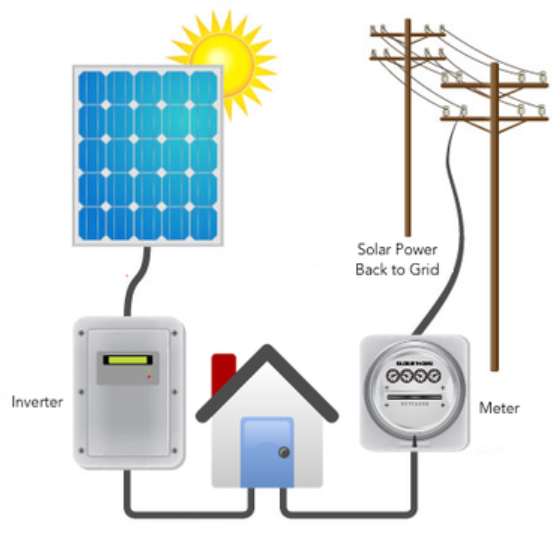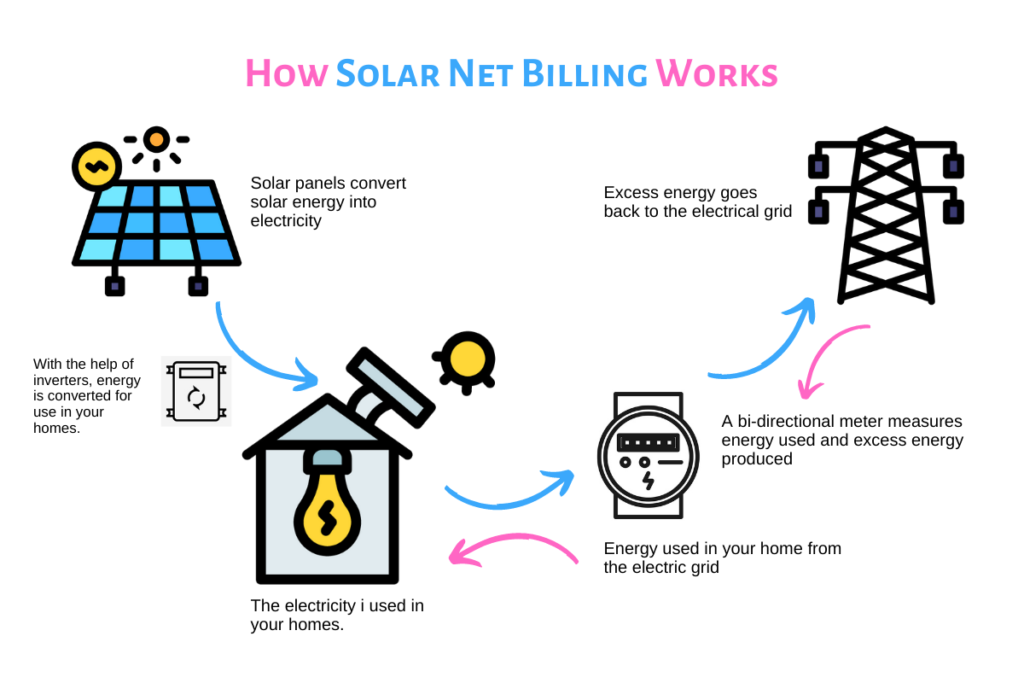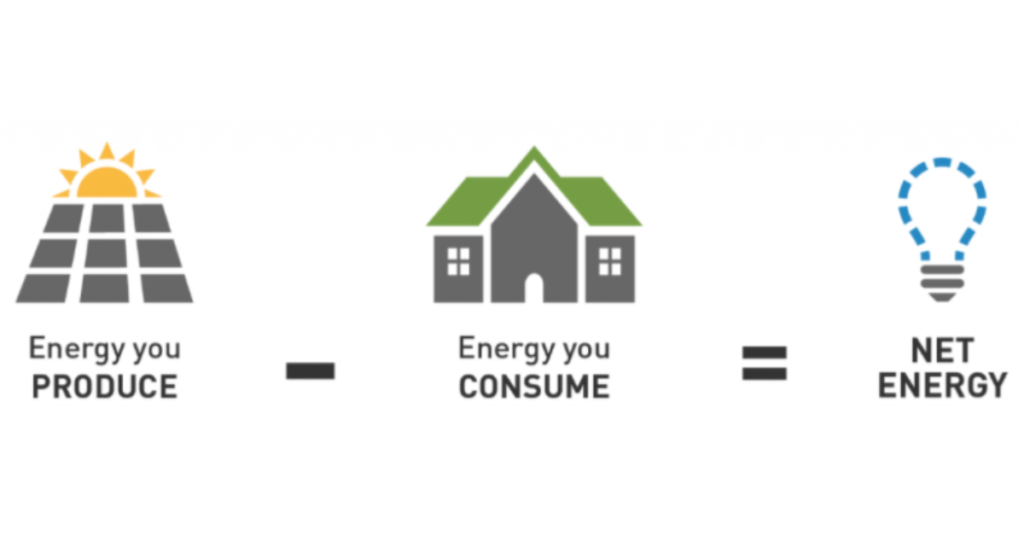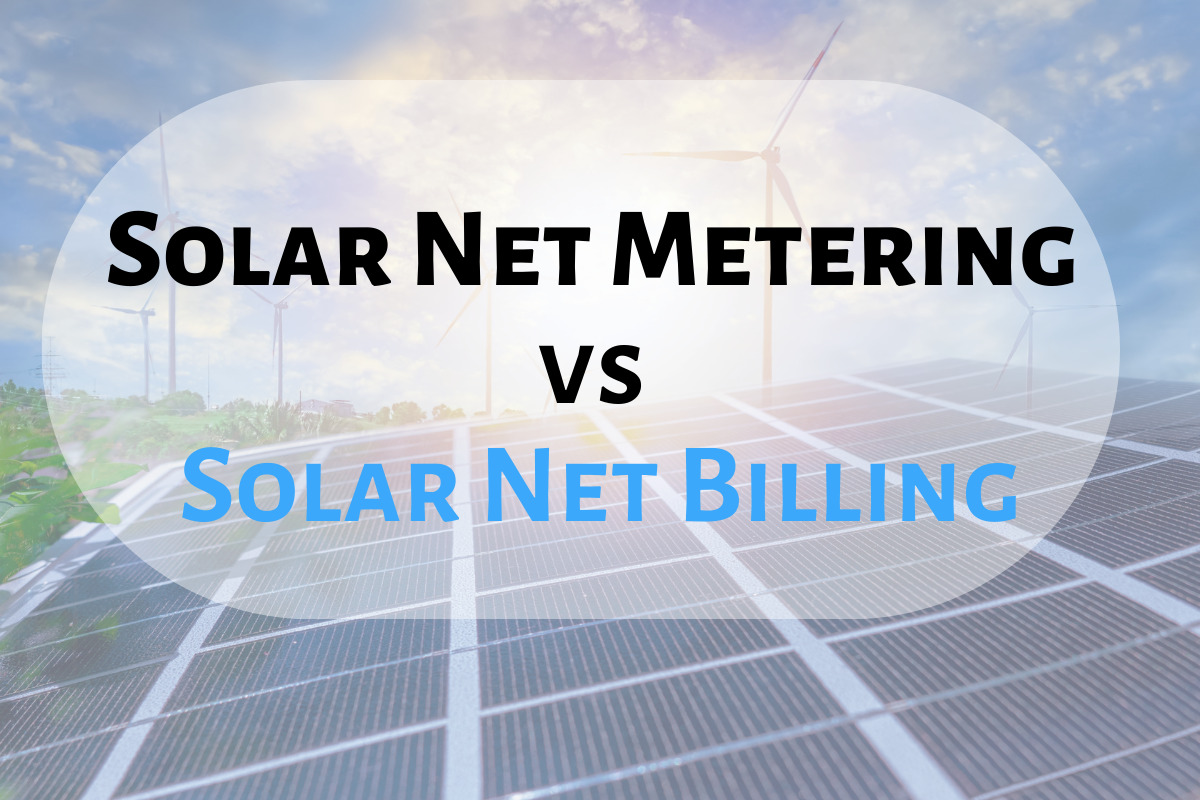Net Metering Vs. Net Billing
Introduction
As the popularity of solar energy continues to rise, understanding the differences between solar compensation methods is essential for both homeowners and businesses seeking to maximize their investment in clean, renewable energy. In this blog post, we’ll demystify the concepts of Net Metering and Net Billing. Let’s dive into these two key components that impact your electricity bill savings when adopting green-energy solutions like solar panels! We will compare their advantages and disadvantages and guide you in choosing the best option for your needs.
Understanding Net Metering And Net Billing
Net Metering is a system that measures the net access electricity supplied to and from the grid by a customer’s solar energy system. At the same time, Net Billing involves compensating customers for surplus power exports at retail or other predetermined compensation rates.

Definition And Concept Of Net Metering
Net metering credits solar energy system owners for excess electricity generated and offsets utility costs during low production periods. Essentially, net metering enables customers with solar installations to be billed only for their “net” energy usage – i.e., the difference between power generated by their systems and consumed over a certain period.
Net metering incentivizes PV solar panel adoption for homes and businesses. Excess energy exported back to the grid earns credits. Consumers can use credits during low production periods. For example, your home generates more electricity than it uses during daylight hours. The surplus energy will be fed into the grid. Meanwhile, you earn credits on your account. During low solar production, like in the evening, you can draw upon the credit solar customers cans. Instead of paying the total price for electricity supplied by utilities, you use up your credits. This dynamic exchange promotes increased adoption of clean energy solutions while drastically cutting costs for participating consumers.
Definition And Concept Of Net Billing
Net billing is another solar energy compensation structure. It allows solar customers to generate electricity and send any surplus back to the grid. Unlike net metering, where the excess power generated is credited at the retail rate, net billing involves compensating customers for surplus energy production at a pre-determined wholesale or supply rate. This means that while both.
For example, consider a residential household equipped with photovoltaic (PV) panels contributing clean energy to the grid through excess electricity production on sunny days. With net billing in place, this household will receive payment—at wholesale or supply rate—for each kilowatt-hour (kWh) sent back into the electrical infrastructure instead of credit applied directly towards reducing its electric bills. This can result in less overall savings than those participating in a net metering program; however, it still encourages renewable resource adoption and contributes positively towards sustainability goals within communities featuring such incentive programs.

The Key Differences Between Them
The primary difference between net metering and net billing lies in how solar customers are compensated for the excess electricity they generate. In net metering, customers receive credits at the total retail rate for every kilowatt-hour (kWh) of energy they send back to the grid, which can be used to offset their own monthly electricity bills. This means that if a customer generates more power than they use during peak solar hours, these credits will effectively cancel out any imported kWh from the utility company at night or on cloudy days.
On the other hand, net billing involves compensating solar producers at a different rate than what they pay for importing energy from the grid – typically a wholesale or supply rate that is lower than retail rates. For example, a solar customer with excess electricity generation receives compensation at 6 cents per kWh under net billing but pays 12 cents per kWh when consuming power from their utility provider. This results in less financial incentive than those under net metering policies who earn credits equal to their consumption rates.
Two compensation systems differ in charge and credit calculations on electric bills. Net billing adjusts to demand or production level changes. On the other hand, net metering measures exports separately. Choosing the right method is crucial for cost savings and renewable technology investment to improve efficiency and sustainability amidst global concerns about finite resources and ecosystem preservation.
Pros And Cons Of Net Metering And Net Billing
Net Metering can provide savings on electricity bills and encourage solar panel installation. However, it also has the potential for changes in compensation rates and may not be available in all areas;. At the same time, Net Billing offers a simpler compensation system and is available in more places; its disadvantage is lower compensation rates.
Advantages Of Net Metering: Savings On Electricity Bills, Encourages Solar Panel Installation
One of the main advantages of net metering is that it allows solar panel owners to save money on their electricity bills. By generating their own energy, they can offset the amount they need to purchase from the grid. This means that their monthly bill will be lower, and they may even eliminate it over time. Additionally, net metering helps promote renewable energy by encouraging more people to install solar panels in their homes or businesses.
For example, a homeowner in California with a 5-kilowatt solar panel system could save up to $1,500 per year on their electricity bill through net metering. And if more homeowners across the state were incentivized to adopt solar power systems at home, this could lead to overall reductions in greenhouse gas emissions generated by traditional sources like coal-fired power plants.
Net metering benefits both individual users and society by promoting cleaner energy production and lowering consumer costs.
Disadvantages Of Net Metering: Potential For Changes In Compensation Rates, May Not Be Available In All Areas
One of the drawbacks of net metering is that compensation rates may change over time, potentially affecting the savings solar energy system owners can achieve on their electric bills. This means that customers who invested in a solar panel system with a certain compensation rate may receive less credit for excess electricity generated in the future. Additionally, net metering may not be available in all areas or for all utility companies, making it harder for some homeowners to take advantage of this form of solar compensation.
In states like Arizona, utilities have implemented changes to their Net Metering policies that reduce credits received by customers with solar panels. These policy changes were made because utilities believed they had unfairly subsidized solar customers by paying them retail rates for power exports when wholesale rates were much lower. Although these policy updates primarily affected new residential installations after their implementation date, existing solar users also faced reduced benefits and ultimate return on investment.
Ultimately, deciding whether net metering is worth depends on individual situations, such as state laws surrounding renewable-energy incentives and each potential customer’s unique needs and preferences.

Advantages Of Net Billing: Simpler Compensation System, Available In More Areas
One of the key advantages of net billing is its simplicity. Unlike net metering, which involves complex calculations, net billing offers a straightforward compensation system for solar energy producers. Solar panel owners can easily understand how their compensation is calculated, making it easier to budget and plan for future energy production.
Another significant advantage of net billing is that it’s available in more areas than net metering. While some states have embraced net metering policies, others may not offer this option due to regulatory restrictions or a lack of support from utility companies. On the other hand, net billing is more widely accepted as an alternative form of solar compensation and can be used in many regions across the United States. As a result, homeowners who live in areas where they cannot access net metering could still benefit from producing excess electricity through solar panels with net billing programs offered by utility companies or other third-party providers.
Disadvantages Of Net Billing: Lower Compensation Rates
One disadvantage of net billing is that the compensation rates for excess energy are typically lower than those of net metering. This means that solar producers may not receive as much credit for their surplus electricity, making installing a solar panel system less financially beneficial. Additionally, some utility companies offer wholesale rates for excess energy, which can be even lower than retail rates. However, it’s worth noting that compensation rates vary depending on location and utility company policies.
Despite the potential for lower compensation rates with net billing, it still has advantages. For example, this type of solar compensation offers a simpler system than net metering since there is no need to measure the amount of electricity generated or used within specific time intervals. Furthermore, net billing may be available in areas where other solar compensations may not exist yet. When choosing net metering or net billing, it’s essential to carefully research and compare compensation rates in your area and consult with professional solar panel installers who can provide expert advice on the best option based on individual circumstances such as location and energy consumption patterns.
Choosing Between Net Metering And Net Billing
When deciding between net metering and net billing, it is important to consider factors such as compensation rates in your area and consulting with a professional solar panel installer; read on to learn more about which option may be right for you.
Factors To Consider When Deciding Between The Two
When deciding between net metering and billing, several crucial factors must be considered. One of the most important is compensation rates. Net metering credits solar energy system owners for the electricity they add to the grid, typically at retail or wholesale rates. In contrast, net billing involves compensating solar producers for their surplus energy at lower wholesale or supply rates. Research and compare compensation rates in your area to determine which option better fits your financial goals.
Another factor to consider is availability. While net metering may be available in many areas, it is not always an option for all customers. In some states like Arizona, specific policies dictate how much solar energy can be added to the grid through a customer’s system before being compensated by utility companies under these policies. If you live in an area where only one type of compensation is available or neither choice can compensate you correctly based on your purchased plans, this will heavily impact your decision-making process.
You should also consult with a professional solar panel installer who can provide insight into whether net metering or net billing might be more beneficial for your specific situation based on aspects such as roof orientation/size and potential shading from surrounding buildings/trees during different times of day/year etcetera.). Combining their knowledge with research about local laws and regulations will help make educated decisions on choosing between these two options when pursuing distributed generation methods via renewable resources.
Research And Compare Compensation Rates In Your Area
Before choosing between net metering and net billing, it’s important to research and compares compensation rates in your area. Compensation rates vary by state and utility company. So, checking with your local utility for their specific policies is important. Some utility companies offer a retail rate for excess electricity generated by solar customers, while others only offer a wholesale rate. In some areas, compensation rates may be lower or unavailable. For example, Arizona has specific solar compensation policies under Net Metering. It’s also a good idea to consult a professional solar panel installer. They can provide insights into the best options based on location and energy consumption needs.
When comparing compensation rates, it’s important to consider both short-term and long-term savings on your electric bill. While net metering typically offers higher compensation rates than net billing, net billing is simpler. You’re only compensated for surplus energy produced rather than tracking production and consumption separately. Additionally, some states may offer incentive programs that offset the initial costs of installing solar panels or provide tax credits for renewable energy systems. This can further increase overall cost savings over time. Doing your research ahead of time and consulting with experts in the field can make an informed decision. It will help you decide whether net metering or billing makes more sense given your circumstances.
Consult With A Professional Solar Panel Installer
It is important to consult a professional solar panel installer when considering whether to use net metering or net billing. A qualified installer can evaluate your energy needs and recommend the best option based on location, energy usage, and available incentives. They can also help you evaluate different compensation rates in your area so that you can make an informed decision.
Consulting a pro installer maximizes solar energy investment and long-term electricity bill savings. Professionals guarantee proper solar panel installation and configuration. They work with both net metering and net billing systems.
This will maximize your system’s electricity, ensuring you receive the maximum compensation possible.

Conclusion
In conclusion, there are pros and cons when choosing between net metering and net billing. Net metering provides more savings on electricity bills and encourages solar panel installation, while net billing offers a simpler compensation system in more areas.
Ultimately, the decision should be based on important factors. Renewable energy is crucial for sustainability and cost savings. Understanding solar producer compensation differences is vital. This includes compensation rates in your area and consultation with professional solar panel installers.
FAQs:
- What is net metering?
Net metering is a method whereby excess energy generated by solar panels is fed back into the power grid. The homeowner is credited for that amount on their electricity bill.
- What is net billing?
Net billing (feed-in tariffs) sells excess energy back to utilities at a predetermined rate per kilowatt-hour. It does not provide a credit on electricity bills.
- How do I know which option is best for me?
The decision between net metering and net billing depends upon individual circumstances. This includes geographic location, system size, and local regulations. Consult a qualified professional who can assess your needs and recommend an appropriate solution.
- Are there any downsides to either option?
Both options have pros and cons. Net metering means homeowners receive credits rather than cash payments for feeding extra power into the grid. In contrast, Net billing generates actual revenue. Still, it sometimes requires additional paperwork or setup fees. These may affect the return on investment over time if not properly managed, depending upon local laws & regulations in place.

